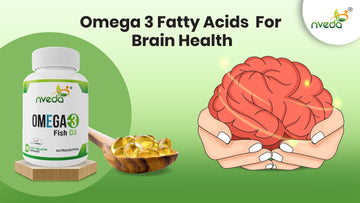In recent years, the health benefits of omega-3 fatty acids have gained widespread attention. While many of us know that these essential fats are important for heart health, they also play a pivotal role in maintaining brain health. Our brain is an incredibly complex organ, and what we eat can have a direct impact on how well it functions, ages, and heals. Omega-3s, particularly DHA and EPA, are essential for optimal brain health. Let’s take a deeper dive into why these fats matter so much for your brain.
What Are Omega-3 Fatty Acids?
Omega-3 fatty acids are a group of essential fats that are vital to your body’s health. Since our body cannot produce them on its own, it’s important to get them through our diet or supplements. There are three main types of omega-3s:
- ALA (Alpha-linolenic acid), found mainly in plant-based sources.
- EPA (Eicosapentaenoic acid), which is primarily found in fatty fish.
- DHA (Docosahexaenoic acid), which is also found in fatty fish and is the most abundant omega-3 in the brain.
For brain health, DHA and EPA are the key players, and they have a range of benefits that support cognitive function and overall mental well-being.
How Omega-3s Benefit Your Brain
-
Boosts Cognitive Function and Memory DHA is a crucial building block of your brain’s cell membranes, particularly in areas responsible for memory and cognitive functions. Regular consumption of omega-3 fatty acids has been shown to support brain functions like memory, learning, and problem-solving. Studies have even suggested that omega-3s may help slow age-related cognitive decline, making them an essential nutrient for maintaining mental sharpness as we age.
-
Anti-Inflammatory Power One of the most powerful benefits of omega-3s is their ability to reduce inflammation. Chronic inflammation is often linked to brain disorders such as Alzheimer's disease, depression, and anxiety. Omega-3s, particularly EPA, have anti-inflammatory properties that help reduce the risk of developing these neurodegenerative conditions and improve mental health in those already affected.
-
Supports Neurogenesis (Growth of New Brain Cells) Omega-3 fatty acids have been found to support neurogenesis, the process of creating new neurons (brain cells). This is especially important in the hippocampus, the area of the brain responsible for memory and learning. Neurogenesis is vital for brain plasticity, which helps the brain adapt and learn new things.
-
Mood and Mental Health Omega-3s have been linked to improved mood and mental well-being. Many studies suggest that these essential fats can help alleviate symptoms of depression, anxiety, and other mood disorders. By regulating neurotransmitter function and reducing inflammation in the brain, omega-3s can support a more balanced and stable emotional state.
-
Neuroprotective Effects As we age, the risk of developing neurodegenerative diseases like Alzheimer’s and Parkinson’s increases. DHA, in particular, has shown neuroprotective effects, helping to preserve brain structure and function over time. Omega-3s may also help reduce the risk of cognitive decline and improve the quality of life for those dealing with these conditions.
What Foods Are High in Omega-3s?
Incorporating omega-3s into your diet is relatively easy, especially if you focus on fatty fish and plant-based sources. Here are some of the best sources:
- Fatty fish like salmon, mackerel, sardines, anchovies, and trout are rich in DHA and EPA.
- Chia seeds, flaxseeds, and walnuts are excellent plant-based sources of ALA, which the body can convert into EPA and DHA, though less efficiently.
- Algae oil is another plant-based source that provides a direct source of DHA and EPA, making it an excellent option for those on a plant-based or vegan diet.
- Fortified foods, such as certain brands of eggs, yogurt, and milk, are also available for those who may not consume fish.
Conclusion
Omega-3 fatty acids are essential for maintaining brain health throughout life. From boosting cognitive function and memory to supporting mood regulation and protecting against neurodegenerative diseases, omega-3s are a powerful tool for supporting brain health. By ensuring that you’re getting enough DHA and EPA, whether through diet or supplements, you can help your brain stay sharp, resilient, and healthy for years to come.
If you're looking to enhance your brain health, consider adding more omega-3-rich foods to your meals today!







